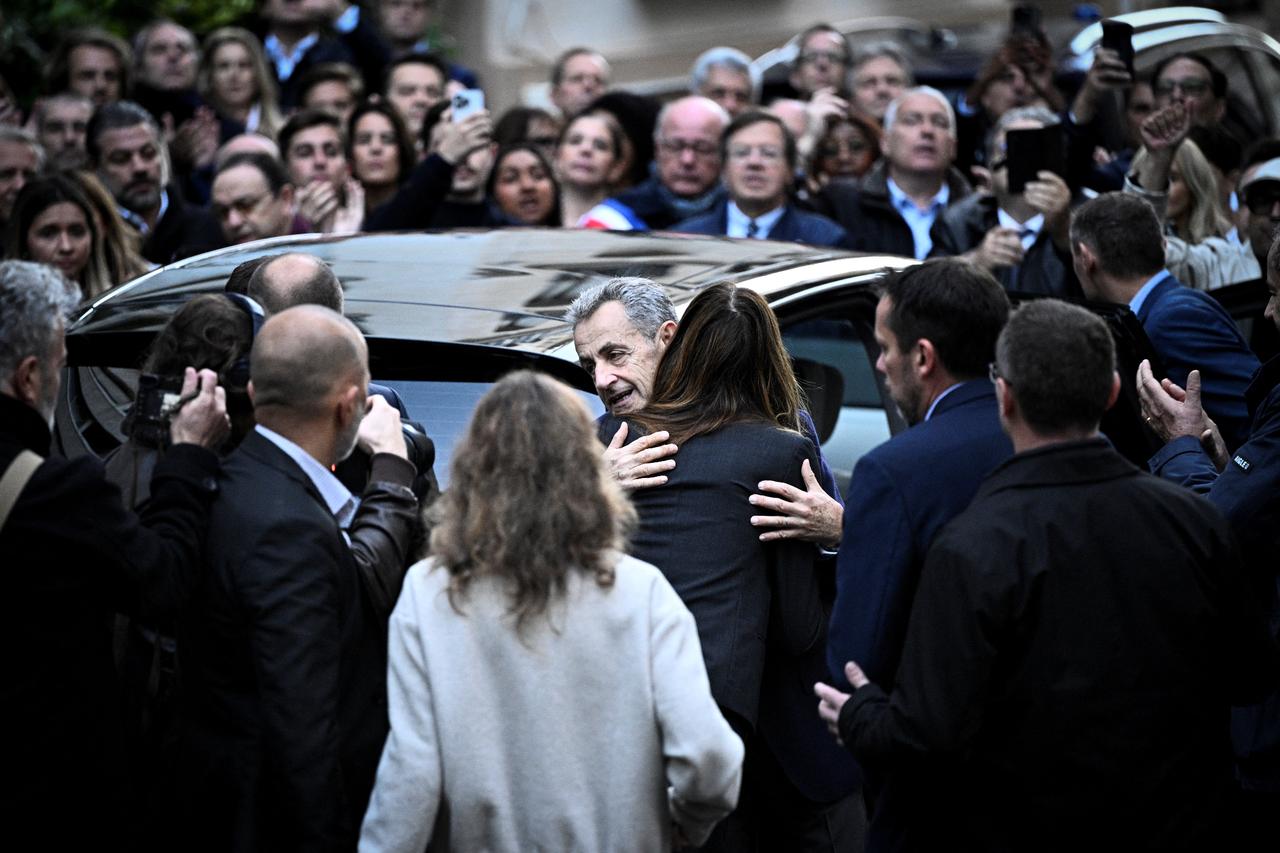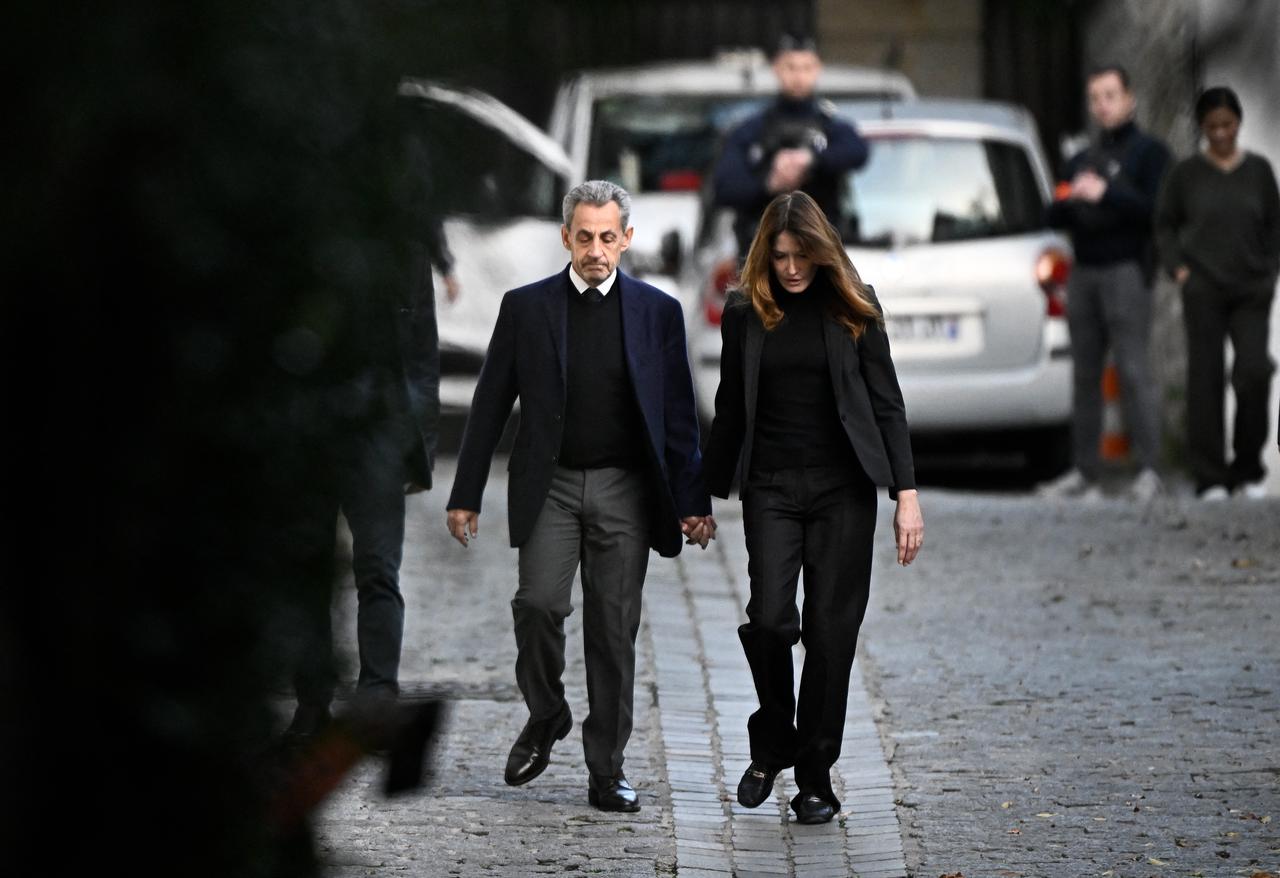
Former French President Nicolas Sarkozy became the first ex-head of an E.U. member state to be jailed Tuesday, proclaiming his innocence as he entered a Paris prison.
France’s right-wing leader from 2007 to 2012 was found guilty last month of seeking campaign funding from Libya's Moamer Kadhafi for the 2007 election that brought him to power.
AFP journalists saw the 70-year-old — who has appealed the verdict — leave his home and, after a short drive escorted by police on motorbikes, enter La Sante prison in the French capital.
“Welcome Sarkozy!” and “Sarkozy’s here,” convicts shouted from their cells, AFP reporters heard.
In a defiant message posted on social media as he was being transferred, Sarkozy denied any wrongdoing.
“It is not a former president of the republic being jailed this morning, but an innocent man,” he wrote on X. “I have no doubt. The truth will prevail.”
Sarkozy was handed a five-year jail term in September for criminal conspiracy over a plan for the late Libyan dictator Kadhafi to fund his electoral campaign.
After his Sept. 25 verdict, Sarkozy said he would “sleep in prison — but with my head held high.”
Dozens of supporters and family members gathered outside his home early Tuesday, some holding framed portraits of him.
“Nicolas, Nicolas! Free Nicolas!” they shouted as he left, holding hands with his wife, singer Carla Bruni.
Earlier, they had sung the French national anthem as neighbors watched from their balconies.
“This is truly a sad day for France and for democracy,” said Flora Amanou, 41, who came to show her support.

Sarkozy is the first French leader to be incarcerated since Philippe Petain, the Nazi collaborationist head of state who was jailed after World War II.
He told Le Figaro newspaper he would take with him a biography of Jesus and a copy of “The Count of Monte Cristo,” a novel about an innocent man sentenced to prison who escapes to seek revenge.
Prison staff told AFP the former president would likely be held in a nine-square-meter (95-square-foot) cell in La Sante’s solitary confinement wing to avoid contact with other prisoners or being photographed on smuggled mobile phones.
In solitary confinement, inmates are allowed one daily walk alone in a small yard and may receive visits three times a week. It remains unclear how long Sarkozy will stay in prison.
Presiding Judge Nathalie Gavarino said during sentencing that the offenses were of “exceptional gravity” and ordered his imprisonment even if he filed an appeal.
Sarkozy’s lawyers are expected to request his release immediately, and the appeals court has two months to examine the request.
The former president has faced a string of legal troubles since losing re-election in 2012.
He has been convicted in two separate trials. In one, he served a graft sentence under house arrest while wearing an electronic ankle tag, which was removed after several months in May.
In the so-called “Libyan case,” prosecutors said Sarkozy’s aides, acting in his name, struck a deal with Kadhafi in 2005 to illegally fund his presidential bid two years later.
Investigators believe that, in exchange, Kadhafi sought help restoring his international image after Tripoli was accused of the 1988 Lockerbie jet bombing over Scotland and another over Niger in 1989, which killed hundreds of passengers.
The court convicted Sarkozy of criminal conspiracy over the funding plan but did not conclude that he personally received or used the money.
He was acquitted on charges of embezzling Libyan public funds, passive corruption, and illicit campaign financing.
Sarkozy had already been stripped of France’s highest honor, the Legion of Honour, following his earlier graft conviction.
A survey by pollster Elabe of more than 1,000 adults found that six in 10 French people consider the prison sentence “fair.”
Despite his convictions, Sarkozy retains support on the French right and has occasionally met privately with President Emmanuel Macron.
Macron hosted Sarkozy at the Elysee Palace on Friday, a meeting the president defended Monday.
“It was normal, on a human level, for me to receive one of my predecessors in this context,” Macron said.